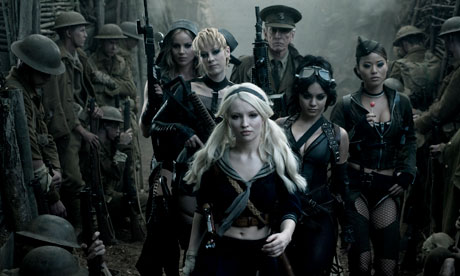
Look around you, and tell me we're not now all the children of Philip K Dick. A man who's been dead almost three decades has a grip on our culture so tight that you can detect his eerie premonitory influence almost everywhere you look.
Only a fortnight ago we saw the release of The Adjustment Bureau, from a Dick story, in which fate is finely calibrated and ruthlessly policed by shadowy men in noir-ish fedoras, and reality is as unstable as fantasy. This week's two big movies in the UK, Source Code and Sucker Punch, have no direct link to Dick but drink from the well of his influence. Source Code is about a soldier who can be projected into the mind of any man with eight minutes left to live, so as to possibly prevent a train-board act of terrorism that's already occurred. It's like having to re-experience Tony Scott's Unstoppable over and over – a nightmare or what? – until the damn thing actually stops. Sucker Punch features a young girl trapped in a 1950s mental institution imagining an infinite number of escape fantasies, some involving B-52 bombers, another with a first world war setting, even one in a nightmarish brothel. It's a lot like Shutter Island, except it makes sense.
The first great Phil Dick movie was, of course, Blade Runner, in which enslaved androids seem human, and some "humans" don't know that they themselves are androids. In its wake there arrived, slowly but surely, the great posthumous wave of Dick adaptations, many of them terrible, some rather good: Minority Report, Paycheck, Next, and, in the memorable column of the ledger, Total Recall and A Scanner Darkly. In each of them reality and imagination intermesh and overwhelm each other, and doppelgangers abound. Does it surprise anyone that Dick was a surviving twin? His sister died aged six weeks, both twins having been born six weeks prematurely.
The movies that used Dick's ideas most smoothly however aren't directly derived from his work. Top of the list is Terry Gilliam's Brazil, whose multiple endings threw our understanding of "reality" completely awry. The Matrix was unadulterated Dick; ditto The Terminator franchise, and Fight Club (when you hear the Pixies' Where is My Mind? you're probably watching a Dick-flick).
We live now largely as adjuncts to our computers, as fallible back-up hard-drives made of meat, subservient one day – and perhaps already – to them and their evil sisters, the TV and mobile phone, with half our minds online, and all our experiences mediated by screens of glass and the ebb and flow of binary code. We have avatars and Second Lives, erasable online identities and the ability to hack into those of others. Dick somehow intuited all of this before the release of the first Apple Mac: he is our George Orwell and our HG Wells; now he just needs his Orson Welles, and the Dick-flick may finally grow up.

